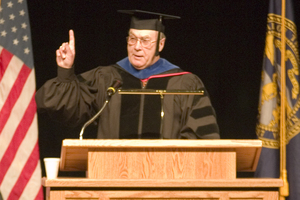Shepherd urges graduates to find worthy causes

Chadron State College history professor Allen Shepherd asked those receiving graduate degrees at CSC on Saturday, “What’s In Your Wallet?”
Shepherd said too many Americans have too many credit cards and don’t save enough of their earnings. He said he recently read that the average American has $6,000 in credit card debt.
“When you spend more than you earn, it’s bad for society,” Shepherd stated.
He quoted theologian John Wesley, who said, “Earn all you can, save all you can, give all you can.”
Shepherd, who is beginning a phased retirement after teaching 34 years at Chadron State, also quoted 19th century Polish poet Cyprian Norwid, who said, “One should have: a, something to live on; b, something to live for; and c, something to die for. The lack of one of these results in drama. That lack of two results in tragedy.”
The speaker pointed to several prominent people who have lived contrasting lives. He noted that Playboy publisher Hugh Hefner has gained fame and riches, but has done it with a decadent lifestyle that is not good for America.
Shepherd said he much prefers to direct attention to Jane Addams, who was born into a wealthy family in 1860. She was one of the few women in American to graduate from college in the 1800s and planned to take a “grand tour” of Europe after receiving her degree.
But after her arrival in London, Addams visited the slums of London, was touched by the poverty she saw, called off the trip and returned to Chicago, where she founded the Hull House and spent the rest of her life helping immigrants learn English and adjust to their new country. She also became a champion for numerous other positive causes and was awarded a Nobel Peace Prize in 1931, four years before her death.
Another example of good works, Shepherd said, was Dr. Jonas Salk’s painstaking search for a vaccine that to prevent polio. He finally accomplished that goal in 1955, and now Rotary Clubs make the vaccine available around the world through their Polio Plus program, and the dreaded disease has nearly been eliminated.
Shepherd also noted that numerous people are willing die for a cause, but the causes aren’t always good ones. He cited John Wilkes Booth’s willingness to die for the “lost cause of the Confederacy” and noted that Oklahoma City bomber Timothy McVeigh and the suicide bombers in the Middle East were/are willing to die for a cause, but they are causes which destroy the lives of many innocent people.
On the other hand, Shepherd paid tribute to American veterans by repeating Nathan Hale’s statement “I regret that I have but one life to give for my country,” and related how Mother Teresa devoted her life to helping the downtrodden in Calcutta.
He also noted that no one can do better than what the apostle Paul wrote to Timothy, "I have fought a good fight, I have finished the race, I have kept the faith.”
Shepherd concluded, “Graduates, treasure yesterday, celebrate today, embrace tomorrow. Take stock of your lives—what you live on, live for and die for.”
Category: Campus News
